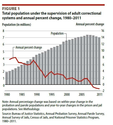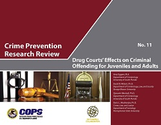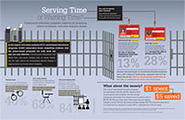-
About
- About Listly
- Community & Support
- Howto
- Chrome Extension
- Bookmarklet
- WordPress Plugin
- Listly Premium
- Privacy
- Terms
- DMCA Copyright
- © 2010-2025 Boomy Labs
 Bob Cameron
Bob Cameron
Listly by Bob Cameron
A list of publicly accessible research in the field of corrections.

After conducting a comprehensive literature search, the authors undertook a meta-analysis to examine the association between correctional education and reductions in recidivism, improvements in employment after release from prison, and learning in math and in reading. Their findings support the premise that receiving correctional education while incarcerated reduces an individual's risk of recidivating.

The Adolescent Diversion Project (ADP) is a strengths-based, university-led program that diverts arrested youth from formal processing in the juvenile justice system and provides them with community-based services.

Presents summary data on the number of offenders under the supervision of the adult correctional systems in the United States at yearend 2011. Persons supervised by the adult correctional systems include those in the community under the authority of probation or parole agencies that supervise adults and those in the custody of state or federal prisons or local jails.

Free research publications by University of Cincinnati researchers on a variety of corrections-related topics.

This paper describes a reentry housing demonstration design process that will fill the gaps in the literature and strengthen policy and practice. The demonstration would include a range of housing and supportive services for formerly incarcerated persons, primarily focused on making meaningful reductions in returns to incarceration.

The objective of this research was to review quasi-experimental and experimental evaluations of the effectiveness of drug courts in reducing future offending and drug use.

An NIJ-sponsored research project examines the impact that GPS monitoring has on the recidivism rates of sex offenders in California.

This project, funded by the Bureau of Justice Assistance, the Substance Abuse and Mental Health Services Administration, and the Public Welfare Foundation, has developed a RNR Simulation Tool to assist local, state, and/or federal agencies in using the risk-need-responsivity approach in practice.

Based on a comprehensive literature review, the authors examined the association between correctional education and reductions in recidivism, improvements in employment upon release from prison, and the cost-effectiveness of correctional education.
![HIV-related research in correctional popul... [Curr HIV/AIDS Rep. 2011] - PubMed - NCBI](http://media.list.ly/production/46226/420845/nihms325167f1-1388514498_185px.png)
The incarcerated population has increased to unprecedented levels following the 1970 US declaration of war on illicit drug use. A substantial proportion of people with or at risk for HIV infection, including those with substance use and mental health disorders, have become incarcerated. The overlapping epidemics of incarceration and HIV present a need for academic medical centers to collaborate with the criminal justice system to improve the health of incarcerated populations.

Explosive growth in the number of people on probation or parole has propelled the population of the American corrections system to more than 7.3 million, or 1 in every 31 U.S. adults, according to a 2009 report.
